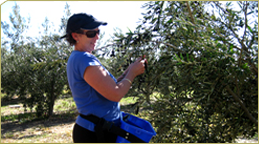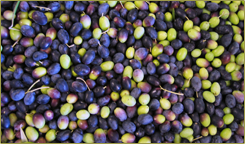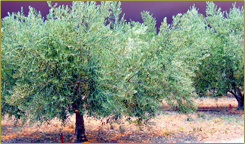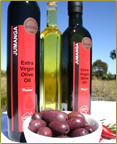
Olive Processing Information
Jumanga Olives specialises in processing olives into high quality extra virgin olive oil for smaller and backyard growers. So if you have just one tree or a whole grove we can help. We have been processing olives since 2005 and have produced many award winning oils. We are based in Carabooda, 20 minutes drive north of Wanneroo near the Yanchep National Park at 360 Old Yanchep Road. Please take the time to read the following information, which should answer most of your questions about having your olives processed by us.
Processing season
The processing season usually runs from the beginning of April till the end of June. The exact starting date varies depending on the season. For 2023 we will be starting on Monday 3rd of April. Sometimes processing runs into July or even August and is based on customer demand.
Processing costs
Standard Costs:
| Amount of Olives | Cost inc. GST ($) |
| Up to 55kg | $26 + 0.58 per kg |
| 55-100kg | Flat rate of $58 |
| 100-200kg | 0.58 per kg |
| 200-400kg | 0.55 per kg |
| 400kg + | 0.50 per kg |
Additional Charges (if any):
| Reason | Cost per kg inc. GST ($) |
| Excess olives over an additional 20 % of booked amount. | 0.10 |
| Olive batch contains greater than 5 % leaves and twigs by weight. | 0.10 |
Bookings
Bookings can be made from the beginning of February. Please phone us as early as possible to make a booking so we can accommodate you and allocate a day most suitable for you. Also if you are planning to bring multiple batches during the season, make multiple bookings ahead of time. Bookings can always be changed if you think your olives are not ready closer to the booked date. We are usually flat out during the processing season so we generally can't accommodate late bookings. Also please don't phone us if you have already picked your olives, we are usually booked out weeks if not months prior. Book in early and then pick to avoid disappointment.
It is very important that you are accurate with the amount of olives that you book in. In past years many customers have delivered more olives than their booking, sometimes double or triple the amount. This has caused delays in processing and unnecessary stress on machine and operator. Accurately estimating the amount of olives on a tree is difficult with a general tendency to underestimate. When making a booking be generous with the amount you book in. We would rather you bring less olives than more.
We will accept up to an additional 20 % over the booked amount without any consultation with us. For example if your booking is for 200 kg we will accept up to 40 kg extra. Each kilogram above 20 % extra will incur an additional charge of 10 cents (inc. GST) above the normal rate (65 verses 55 cents/kg inc. GST). We also cannot guarantee that additional amounts above 20 % extra will be processed on the booked day, since it would be unfair to delay the processing of olives from other customers. Although a delay may occur every effort will be made to process extra amounts as soon as possible.
If you start harvesting and find you are going to have a lot more than your booked amount (greater than 20 %), stop picking and give us a call. Either we can accept the extra amount (with no additional charge) or you may have to make an additional booking for another day.
Olive varieties
There are several thousand named olive varieties worldwide, with about 50-100 represented in Australia. The majority of these varieties have been selected since the start of olive cultivation about 6000 years ago. The remaining few have come from relatively recent olive breeding programs, for example barnea (Israel) and UC13A6 (California). In addition to the thousands of named varieties there are many more unnamed, unique trees that have been grown from seed and are genetically different to the parent tree(s). In general, olives from seed grown trees are low in oil.
All olives contain oil however the percentage can vary widely between 5 to 30 %. In general smaller fruited varieties contain more oil than larger ones. From our experience since 2005, oil content is usually between 10 and 22 % with a season average around 17 %. The following table indicates the normal oil content of some common locally available varieties at optimal ripeness.
| Category | Oil Content (%) | Varieties |
| High oil | 18+ | Frantoio, Picual, Coratina, WA Mission (Olea Mission), Arbequina, Koroneiki, Nevadillo Blanco, Correggiola, New Norcia Mission, FS17, Minerva, Californian Mission, Moraiolo |
| Medium oil | 14-18 | Manzanillo (Manzanilla de Sevilla), Leccino, Barnea, Kalamata, Oblitza, Picholine, Volos (Konservolia), Aglandau, Hardy's Mammoth |
| Low oil | Less than 14 | Verdale (SA), Pendolino, Hojiblanca, Californian Queen (UC13A6), Jumbo Kalamata (Oliva di Cerignola), Queen of Spain (Sevillano), Azapa, Barouni, Ascolano, Olives from seed grown trees (usually). |
Harvest timing
The optimal harvest time for your olives will vary according to variety, growing conditions and the style of oil you want to achieve. As a general rule olives are best picked for oil when their skin colour is half green/half black. This means in a batch of olives some will be completely green, some completely black and some will be in between. See photo below. You don't have to selectively pick a tree.
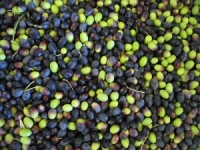
click photo to enlarge
There are some exceptions to the above rule;
- Larger fruited varieties normally intended for pickling such as manzanillo should be picked on the greener side. Olives should still have some colour but shouldn't be allowed to go too black. If too ripe, clean oil extraction can be difficult or impossible. One way to overcome any potential problems is to mix large olives with true oil olives which are usually smaller.
- Some olive varieties such as leccino and pendolino turn black early in the season, long before they have reached their maximum oil content. These varieties should be harvested completely black otherwise oil extraction percentages will be lower than they should be.
- Olives on water stressed trees will turn completely black early in the season, before they have reached their maximum oil content. These olives are okay processed black.
- Olives on heavily laden trees ripen very slowly, particularly when the weather cools off in autumn. Olives on these trees may not ripen beyond the green stage at all. In this case picking your olives green is okay but wait, till at least May.
Olive harvesting
Olive harvesting should be carried out in a way that minimises fruit damage. Ideally olives should be picked by hand in dry weather however this is not always possible. Harvesting with rakes onto mats (shade cloth, tarps) spread out under the tree is okay too but avoid stepping on the fruit. Some leaves and twigs amongst the picked fruit are acceptable but remove excessive amounts particularly dry twigs. Make sure no foreign materials get mixed with the olives. This is particularly important when using mats as sand and rocks are easily kicked or walked on. Rocks and larger hard objects can seriously damage the machine. Objects found in the past include rocks, nails, screws, jewellery, coins and many more. If these are found we cannot process your fruit unless it is then carefully hand sorted by you.
Ideally your olives should be put into well ventilated plastic crates holding no more than 30 kg. Sturdy cardboard boxes, fabric shopping bags and buckets are okay too. Whichever container you use please make sure each holds approximately the same amount. This way you know how many olives you have picked and avoids the need to weigh every individual container before processing. There is no need to keep varieties separate. Storing and transporting olives in large plastic, poly or heshen bags is not acceptable. Olives get warm, sweat and are easily damaged during transport which can lead to rapid deterioration of fruit and reduce oil quality significantly.
Ideally olives should be processed as soon as possible after picking. However if not damaged and stored correctly will still be in excellent in condition up to 4-5 days old with minimal decrease in oil quality. Damaged olives, particularly which are black and soft will need to be processed as soon as possible. If picking over a few days it is sometimes better to keep you olives spread out on a mat before crating and transport. In general keep your olives dry, well ventilated, cool and out of the sun.
Over the last few years we have noticed an increase in the occurrence of anthracnose affected fruit. Anthracnose is a fungal disease that causes olives to rot on the tree. This rot usually starts at the tip and is most commonly seen on larger varieties. The odd rotten fruit is okay, however trees severely affected should not be harvested, since oil quality will be poor. Olives that are mildly affected should be kept very well ventilated and need to be processed as soon as possible. Any olives you have concerns about should be kept separate. We can then advise if they are acceptable or not to include.
Delivering your olives
Your olives and oil containers need be delivered no later than the day before your booking between 4 and 5:30pm. If this is not suitable for you just let us know and other arrangements can be made.
Please remember to bring clean containers to store your oil (100 kg of olives will produce up to 20 litres), alternatively we can provide 20 litre plastic containers with tap for $15 each. Also please make sure your olives have not been picked any earlier than 5 days before the booked processing day and are in good condition. Any olives that are too old, rotten or mouldy will not be processed.
It is not possible for you to wait for your olives to be processed since accurate scheduling is not possible for the following reasons;
- Batches of olives similar in nature are processed consecutively to minimise the need to change centrifuge settings which is both time consuming and disruptive to the process.
- The speed of extraction can vary greatly depending to the variety and nature of olives being processed.
- The amount of olives delivered is often more or less than the booked amount.
- Processing often takes place at night, outside of normal working hours, particularly if the weather is hot at the start of the season.
If the mill is running when you deliver your olives, you're welcome to have a look and we'll give you a quick rundown of the process.
Processing
Your olives will be processed using our Oliomio 200 from Italy which we have been running since 2005. This mill uses a 2 phase process which produces excellent quality oil, high in antioxidants (polyphenols). Once up and running the mill can continuously process between 100 to 200 kg of olives per hour depending on the olives being processed. The following is a brief outline of the process;
- Olives are weighed and their condition assessed.
- The olives are de-leafed and washed in water.
- Olives are crushed (seed and flesh) with a hammermill into a fine paste.
- The paste is slowly mixed for 30-60 minutes and gently warmed to 25oC.
- The paste is then fed into the centrifuge which separates the oil.
- Olive oil flows out of the front spout and waste is pumped outside.
- Oil is poured into your containers for settling and the volume is calculated.
We only process good quality olives so most extracted oils (95 %+) will easily meet extra virgin grade standards. Olives in poor condition will not be processed for the benefit of other customers. Processing poor quality olives will taint the machine and off aromas will carry through to following batches. This would be very unfair to most customers that take exceptional care to produce top quality extra virgin olive oil.
Occasionally processing issues can arise particularly with larger olives high in water, especially when too ripe. Some varieties we have had problems with in the past include manzanillo, kalamata, UC13A6(Californian queen), hojiblanca and leccino. Olives containing high moisture levels and/or are too ripe produce pastes that are very wet and sloppy. Oil/water emulsions can occur making clean oil extraction virtually impossible. In these cases food grade talcum powder is added which firms the paste and makes extraction possible. Talc in non toxic and no residues remain in the extracted oil. Research has shown that the use of talc has little effect on oil quality and improves extraction efficiency. Although every effort is made to avoid extraction problems, talc is sometimes the last remaining option.
In the event of a mill breakdown, the processing of your olives may be delayed. Luckily the mill has been reliable over the years with only minor breakdowns and short delays. If a more serious breakdown occurs we may not be able to process your olives in prompt time. In this case your olives would have to be taken elsewhere to get processed.
Payment and oil pickup
Payment can be made via Credit/debit card, cash, cheque or EFT when you pickup your oil. Pickup can be made on an arranged day convenient to you. Your oil will be stored in our coolroom so there is no hurry to pick it up. For EFT payments the bank details are as follows;
Account name: Jumanga Olives
BSB: 036 226
Account Number: 192 409
Oil settling and storage
Although your oil is perfectly edible as soon as it's extracted, it should be allowed to settle to maximise its shelf life. We recommend you let your oil settle for approximately 4 weeks in a cool (ideally 15-21oC) dark place. In this time fine particles and traces of water suspended in the oil settle to the bottom forming a sediment. Once settled carefully decant your oil into glass bottles or another clean container (preferably stainless steel), which is easier if your settling container has a tap. During settling the oil will usually become clear. If your oil is still cloudy after 4 weeks still transfer it off the sediment. Some oils remain cloudy without filtration, however this is perfectly okay. Long term cloudiness is caused by natural fruit waxes similar in density to oil which remain in suspension. Oil from some varieties such as manzanillo are more likely to stay cloudy than others. Never let your oil settle any longer than 6 weeks, otherwise off flavours and aromas from the sediment may start to taint the oil. We can provide you with 250 or 500 mL glass bottles including lid for $2.00 each.
Store your oil in a place that is dark and doesn't fluctuate in temperature too much. Also for long term storage make sure any bottles or containers are completely full and sealed to reduce exposure to air. If settled and stored correctly your oil should keep atleast 1 to 2 years. Remember unlike wine your oil will never be better than the day it's made.
Contact and Address
For bookings and enquiries please phone (08) 9561 2411 or 0421 579 118
Jumanga Olives
360 Old Yanchep Rd
Carabooda WA 6033
Other processors
During the processing season we are usually fully booked a few weeks in advance. If we cannot accommodate you the following is a list of other processors that might be able to help you out;
Small to medium batches
Tarralea Grove (Barry and Anne Sander), Jarrahdale, Ph: 9525 5338 Mob: 0414 457 049
Michael, Gabbadah (near Guilderton), Mob: 0477 773 627
Rob Angel, Karakin (near Lancelin), Mob: 0429 188 611
Medium to larger batches
York Olive Oil Co. (Arnaud), York, Ph: 9641 2200 Mob: 0429 412 200

